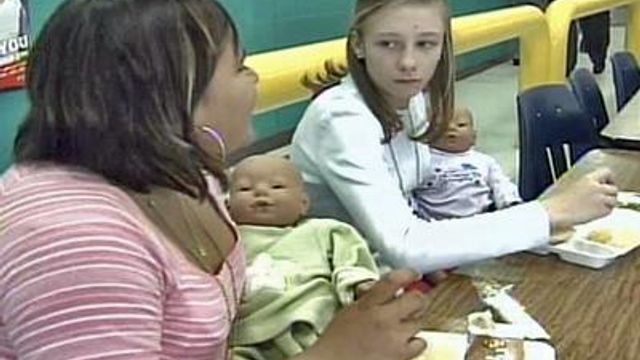Baby, Think It Over: N.C. Ranks 9th for Teen Pregnancies
A Dunn Middle School teacher is giving her students a reality check about teen pregnancy: it is not an easy job.
Posted — UpdatedIn 2006, 19,192 girls between the ages of 15 and 19, both married and unmarried, got pregnant in North Carolina. Of those teens, 29 percent had been pregnant before. Some research shows that 63 percent of high school seniors said they had had sex.
At Dunn Middle School, life-skills teacher Elizabeth D'Herde has made it her mission to give her students a reality check on what it means to be a parent. For five years, she's taught a course called "Baby, Think It Over" to seventh-grade boys and girls.
Students are given dolls resembling 3-month-old babies. And like infants, these dolls cry constantly and rarely sleep.
"I want them to see the real effect of taking care of a child and what the responsibilities of being a parent are," D'Herde said.
- that abstinence is "the only certain way to prevent unintended pregnancy" and "reduce the sexual transmission of diseases, including HIV/AIDS."
- about how sexually transmitted diseases are spread, the effectiveness of federal Food and Drug Administration-approved methods to reduce the risk of transmission and local resources for testing and treating STDs.
- about the effectiveness and safety of FDA-approved contraceptive methods, including emergency contraception.
- life skills for healthy behaviors and to avoid risky behaviors, such as alcohol and drug abuse, especially intravenous drug use.
The bill would allow abstinence-only programs to be taught up to the seventh grade and require that school systems allow parents to review all sexual-education materials before they are taught.
North Carolina's current sex education curriculum focuses mostly on encouraging abstinence until marriage for middle- and high-school students.
In D'Herde's classes, the message of parental responsibility seems to be getting through to students.
The "mommies" and "daddies" are responsible for caring for their "children" for 24 to 48 hours. They must take the dolls – and their car seats – with them everywhere they go. One hour of babysitting is the only break they get, and the dolls get much louder during the night.
"I rocked it and rocked it, and it wouldn't stop," seventh-grade 'mommy' Keitora Smith said. "I put the sensor in, laid it back down, and it went, ugh, and started crying again."
D'Herde said she hopes students will remember the experience when they are in high school and most at risk of pregnancy.
"I'm not going to have a baby when I'm a teenager," Keitora said.
"I wouldn't be ready to be a parent," another "mommy" agreed.
• Credits
Copyright 2024 by Capitol Broadcasting Company. All rights reserved. This material may not be published, broadcast, rewritten or redistributed.





